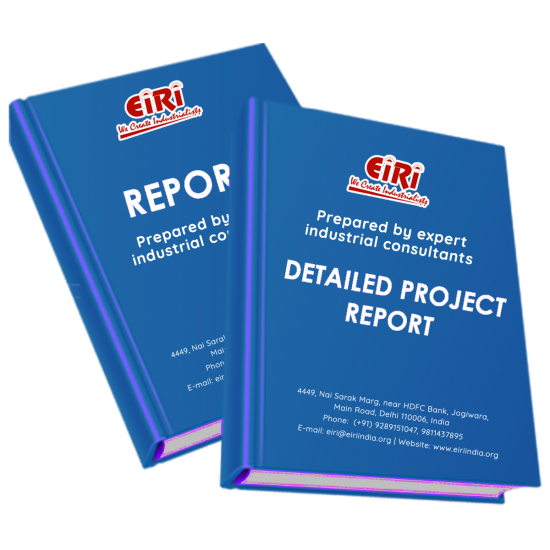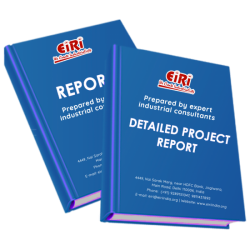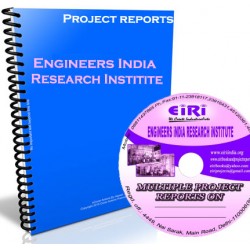Detailed Project Report on porcelain pin insulators (11kv & 33kv)

- More than 40 years of experience
- Managed by expert industrial consultants
- ISO 9001-2015 Certified
- Registered under MSME, UAM No: DL01E0012000
- 24/5 Research Support
Get your quesries resolved from an industry expert. Ask your queries before report or book purchase. - Custom Research Service
Speak to the our consultant to design an exclusive study to serve your research needs. - Quality Assurance
All reports are prepared by highly qualified consultants & verified by a panel of experts. - Information Security
Your personal & confidential information is safe & secure.
PORCELAIN PIN INSULATORS (11KV & 33KV)
[CODE NO.4256]
Electrical Insulator is used in electrical system to prevent unwanted flow of current to the earth from its supporting points. The insulator plays a vital role in electrical system. Electrical Insulator is a very high resistive path through which practically no current can flow. In transmission and distribution system, the overhead conductors are generally supported by supporting towers or poles. The towers and poles both are properly grounded. So there must be insulator between tower or pole body and current carrying conductors to prevent the flow of current from conductor to earth through the grounded supporting towers or poles.
The main cause of failure of overhead line insulator, is flash over, occurs in between line and earth during abnormal over voltage in the system. During this flash over, the huge heat produced by arcing, causes puncher in insulator body. Viewing this phenomenon the materials used for electrical insulator has to possess some specific properties. The materials generally used for insulating purpose is called insulating material. For successful utilization, this material should have some specific properties as listed below:
• It must be mechanically strong enough to carry tension and weight of conductors.
• It must have very high dielectric strength to withstand the voltage stresses in High Voltage system.
• It must possess high Insulation Resistance to prevent leakage current to the earth.
• There physical as well as electrical properties must be less affected by changing temperature
Porcelain in most commonly used material for overhead insulator in present days. The porcelain is aluminum silicate. The aluminum silicate is mixed with plastic kaolin, feldspar and quartz to obtain final hard and glazed porcelain insulator material. The surface of the insulator should be glazed enough so that water should not be traced on it. Porcelain also should be free from porosity since porosity is the main cause of deterioration of its dielectric property. It must also be free from any impurity and air bubble inside the material which may affect the insulator properties.
The combination of porcelain and other minerals allows electricity to pass without reacting with nearby electrical conductors. Since porcelain does not conduct electricity, especially when combined with other non-conductive materials, it makes the ideal material for insulators. Porcelain insulators typically contain large concentrations of some other mineral like alumina or clay. The combination of porcelain and other minerals allows electricity to pass without reacting with nearby electrical conductors. This not only ensures greater safety, but enables the electricity to pass without losing any of its charge. Since porcelain does not conduct electricity, especially when combined with other non-conductive materials, it makes the ideal material for insulators.
An insulator used to insulate a wire, such as a pin on a utility pole from a physical reinforcement is known as a Porcelain pin insulator. The pin insulator is used in power delivery for voltage up to 33kV. It is positioned on the cross arm of the supporting tower. The pin insulator has grooves at the top to keep the conductor. The conductor is connected to the insulator by the angled binding wire of the same material as the conductor on the top groove on the straight-line positions and side groove. A lead thimble is cemented into the insulator body to receive the pin.
Depending on the application voltage, the pin insulator may be one part, two parts, or three parts. As the voltage is higher, the thicker the insulator requires to have enough insulation.
Pin insulator comprises two main components: porcelain and galvanized bolt-in steel. The bolt is joined by cementing at the foundation. The insulator against bolts may be secured by several techniques.
Porcelain insulators provide years of reliable and consistent performance in the most rugged environments. Porcelain insulators are the most widely applied insulator in electrical transmission & distribution systems. From salty seaside substations to highly corrosive petrochemical facilities along the equator, porcelain insulators enable continued operation at the designed voltages.
The global Pin Porcelain Insulators market was valued at USD million in 2020 and it is expected to reach USD million by the end of 2027, growing at a CAGR of % during 2021-2027.
It is intended to prepare a Feasibility Report to install a Porcelain Insulators (11KV and 33KV) production facility with an installed capacity of 600000 Pieces / Year as a Green Field Project.
COST ESTIMATION
Plant Capacity 2000 Pieces/Day
Land & Building (8490 sq.mt.) Rs. 4.07 Cr
Plant & Machinery Rs. 11.93 Cr
Working Capital for 3 Months Rs. 4.35 Cr
Total Capital Investment Rs. 21.33 Cr
Rate of Return 72%
Break Even Point 39%
- • INTRODUCTION
- • USES/APPLICATIONS/ADVANTAGES
- • DIFFERENCES BETWEEN PORCELAIN PIN INSULATOR AND POST
- INSULATOR
- • TYPICAL SPECIFICATIONS OF PORCELAIN PIN INSULATORS
- • TESTING/APPLICABLE CODE & STANDARD
- • MARKET OVERVIEW
- • RAW MATERIALS
- • DESIGNING CONSIDERATION OF ELECTRICAL INSULATOR
- • PROCESS STEPS/PROCESS FLOW SCHEMATIC
- • BROAD EQUIPMENT DETAILS
- • PRODUCTION LINE – RAW MATERIAL SOURCE/EQUIPMENT
- • APPLICATION
- • UTILITY REQUIREMENT (ESTIMATED) - MONTH
- • PLANT & MACHINERY SUPPLIER/TURNKEY CONSULTANTS
- • WASTE GENERATION & MANAGEMENT/GREEN BELT
- • HEALTH SAFETY AND ENVIRONMENT
- • ANTICIPATED ENVIRONMENTAL IMPACTS
- • MITIGATION MEASURES (PROPOSED)
- • HEALTH SAFETY & ENVIRONMENT
- • SAFETY & OCCUPATIONAL MEASURE
- • PROPOSED IMPLEMENTATION SCHEDULE
- • PROJECT FINANCIALS
- • CORRESPONDENCES (WITH CLIENT)
APPENDIX – A:
01. PLANT ECONOMICS
02. LAND & BUILDING
03. PLANT AND MACHINERY
04. OTHER FIXED ASSESTS
05. FIXED CAPITAL
06. RAW MATERIAL
07. SALARY AND WAGES
08. UTILITIES AND OVERHEADS
09. TOTAL WORKING CAPITAL
10. TOTAL CAPITAL INVESTMENT
11. COST OF PRODUCTION
12. TURN OVER/ANNUM
13. BREAK EVEN POINT
14. RESOURCES FOR FINANCE
15. INSTALMENT PAYABLE IN 5 YEARS
16. DEPRECIATION CHART FOR 5 YEARS
17. PROFIT ANALYSIS FOR 5 YEARS
18. PROJECTED BALANCE SHEET FOR (5 YEARS)
How to Make Project Report?
Detailed Project Report (DPR) includes Present Market Position and Expected Future Demand, Technology, Manufacturing Process, Investment Opportunity, Plant Economics and Project Financials. comprehensive analysis from industry covering detailed reporting and evaluates the position of the industry by providing insights to the SWOT analysis of the industry.
Each report include Plant Capacity, requirement of Land & Building, Plant & Machinery, Flow Sheet Diagram, Raw Materials detail with suppliers list, Total Capital Investment along with detailed calculation on Rate of Return, Break-Even Analysis and Profitability Analysis. The report also provides a birds eye view of the global industry with details on projected market size and then progresses to evaluate the industry in detail.
We can prepare detailed project report on any industry as per your requirement.
We can also modify the project capacity and project cost as per your requirement. If you are planning to start a business, contact us today.
Detailed Project Report (DPR) gives you access to decisive data such as:
- Market growth drivers
- Factors limiting market growth
- Current market trends
- Market structure
- Key highlights
Overview of key market forces propelling and restraining market growth:
- Up-to-date analyses of market trends and technological improvements
- Pin-point analyses of market competition dynamics to offer you a competitive edge major competitors
- An array of graphics, BEP analysis of major industry segments
- Detailed analyses of industry trends
- A well-defined technological growth with an impact-analysis
- A clear understanding of the competitive landscape and key product segments
Need Customized Project Report?
- Ask for FREE project related details with our consultant/industry expert.
- Share your specific research requirements for customized project report.
- Request for due diligence and consumer centric studies.
- Still haven't found what you're looking for? Speak to our Custom Research Team
About Engineers India Research Institute:
Note: We can also prepare project report on any subject based on your requirement and country. If you need, we can modify the project capacity and project cost based on your requirement.
Our Clients

Our Approach
- Our research reports comprehensively cover Indian markets (can be modified as per your country), present investigation, standpoint and gauge for a time of five years*.
- The market conjectures are produced on the premise of optional research and are cross-accepted through associations with the business players
- We use dependable wellsprings of data and databases. What's more, data from such sources is handled by us and incorporated into the report
Why buy EIRI reports?
- Our project reports include detailed analysis that help to get industry Present Market Position and Expected Future Demand.
- Offer real analysis driving variables for the business and most recent business sector patterns in the business
- This report comprehends the present status of the business by clarifying a complete SWOT examination and investigation of the interest supply circumstance
- Report gives investigation and top to bottom money related correlation of real players/competitors
- The report gives gauges of key parameters which foresees the business execution























